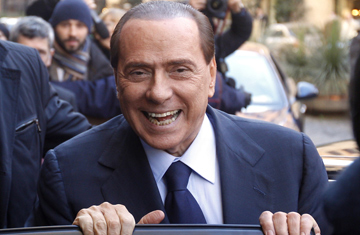
Italian Prime Minister Silvio Berlusconi leaves the Senate in Rome, December 13, 2010
Only two things are clear about the vote of confidence faced by Italian Prime Minister Silvio Berlusconi on Tuesday. One is that it will be a photo-finish, with the outcome unpredictable until the final count. The other is that the premier will end the day a weakened man.
Even the best-case scenario leaves Berlusconi, who once enjoyed the largest majority in Italian history, clinging to his coalition by a handful of votes, with his government at risk of collapse with every major decision. Other possibilities could see the extroverted media tycoon relegated to a supporting role in a technical government, or out of power completely, politically staggered ahead of a fresh round of elections most likely in the spring, and dangerously exposed to prosecution for tax fraud and corruption. "He's wounded," says Giuliano Ferrara, editor of daily Il Foglio newspaper and a friend and occasional advisor to the prime minister. "Berlusconi's situation is a difficult one."
Contributing to the uncertainty is the nature of the opposition, a jumble of left-wing and centrist political parties with little common ground other than the desire to see the ouster of the scandal-ridden premier. "There's an air of the end of the regime, a sunset of Berlusconi," says Ferrara. "But at the same time, nobody has any idea what would come after him."
The parliamentary wrestling match follows a long autumn of embarrassing revelations, from allegations of "bunga-bunga" sex parties at Berlusconi's residences to accusations of governmental neglect over the crumbling of ancient Pompeii to intimations in the WikiLeaks cables that Berlusconi may have personally profited from secret deals with Russian Prime Minister Vladimir Putin.
The drumbeat of controversy has cost Berlusconi much of his support in parliament, including that of the speaker of the lower house, his former ally Gianfranco Fini, who joined the opposition in calling for the prime minister to step down. "In a normal situation, Berlusconi would have already resigned," says Marco Damilano, a political reporter with the Italian newsmagazine L'Espresso. But so far, none of Berlusconi's opponents have been able to take advantage of the leader's fumbles. "There is, in the opposition, a deficit of alternatives," says Nichi Vendola, the governor of the southern region of Puglia and a leading left-wing politician.
Further muddying the waters is the likelihood that Berlusconi will once again find himself facing trial for tax fraud and corruption. He has been protected from appearing in court by a law passed last year that allows top government officials to put their trials on hold during their time in office. Berlusconi's ouster would strip him of that immunity. And even if he does survive the confidence vote or becomes part of a new government, Italy's top court — which has twice struck down similar laws — will consider the law's constitutionality in January and is widely expected to overturn it.
As a result, Berlusconi risks finding himself asked to appear in court, even as the country braces itself for another round of elections. In one proceeding, he stands accused of bribing David Mills, a British lawyer who was convicted in 2009 of having accepted $600,000 from the prime minister in exchange for giving false testimony in two corruption trials. Though Mills' sentence was overturned last year when the statute of limitations ran out, much of the evidence gathered against him could also be used against Berlusconi. "Most of the facts of the case have been decided," says Peter Gomez, author of Berlusconi's Gift, a book about the Mills case. "The court would only need to establish [whether] Berlusconi gave the order or not."
Yet even a quick conviction wouldn't be enough to put a nail in Berlusconi's coffin, or bar him from the political scene. The prime minister has been wrestling with the legal system since before he came into office. And while he's been convicted several time — for perjury, bribery and corruption — he has always managed to beat the rulings through appeals or by running out the statute of limitations. Berlusconi and his supporters maintain he is innocent and the subject of persecution by left-wing prosecutors. And the prime minister's control of most of Italian television, through his media company's three channels or through his allies at the public carrier, give him a powerful megaphone through which to make his case. "Berlusconi is a normal Italian," says Il Foglio editor Ferrara. "He's only an anomaly because he's done something important. And for that they want to make him pay."
In a last-minute appeal in front of the Italian Senate Monday, Berlusconi warned against unseating his coalition at a time of economic instability. "I ask you to reflect on what madness it would be to initiate a crisis without a foreseeable solution," he said. Whether or not Berlusconi survives the confidence vote on Tuesday, one thing's for sure: the situation in Italy could remain unpredictable for a while yet.
